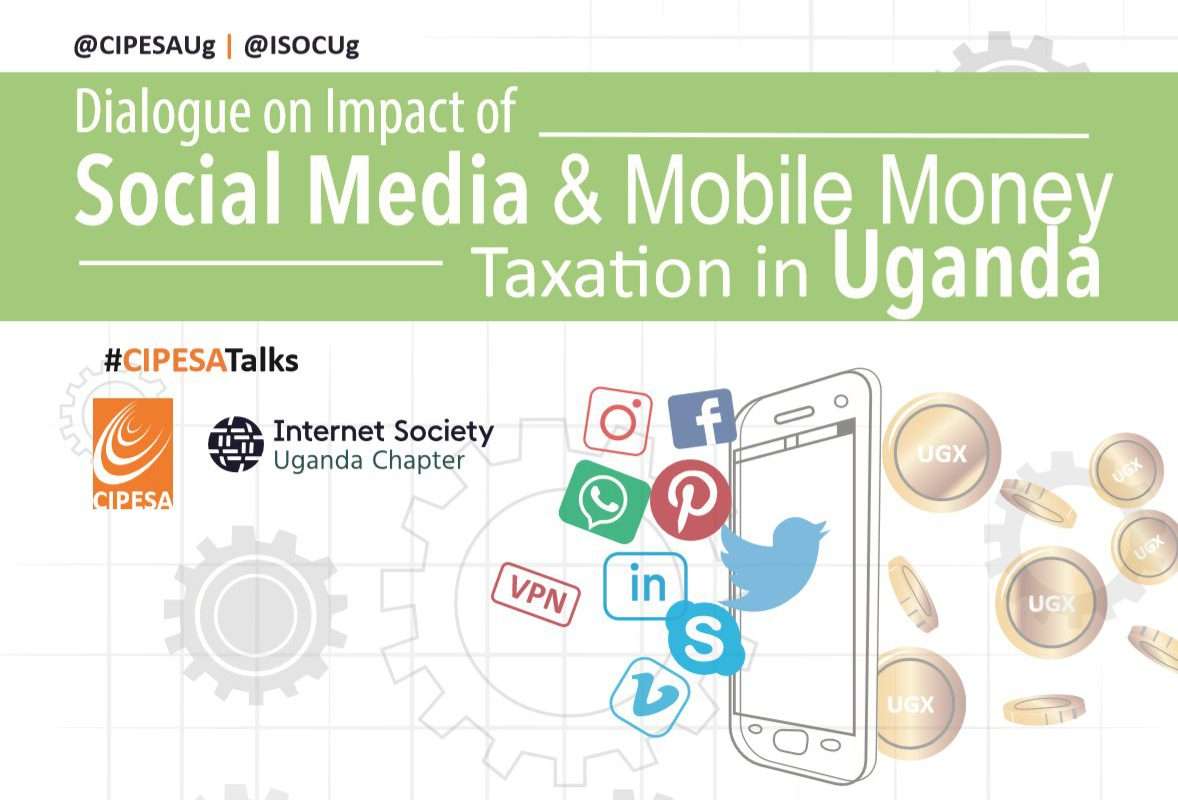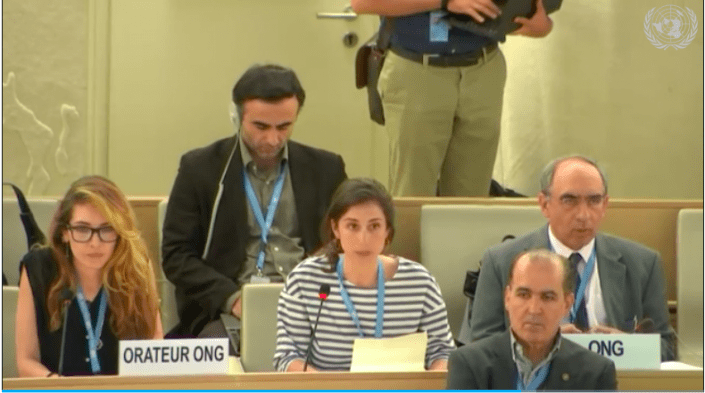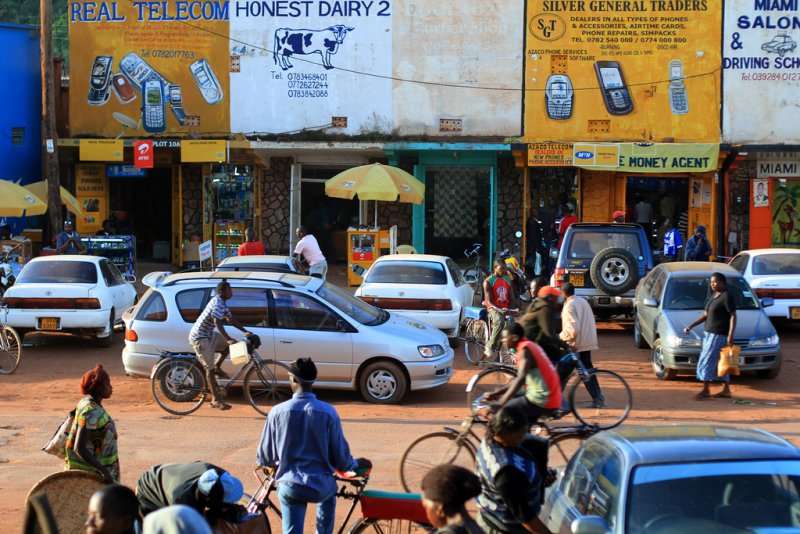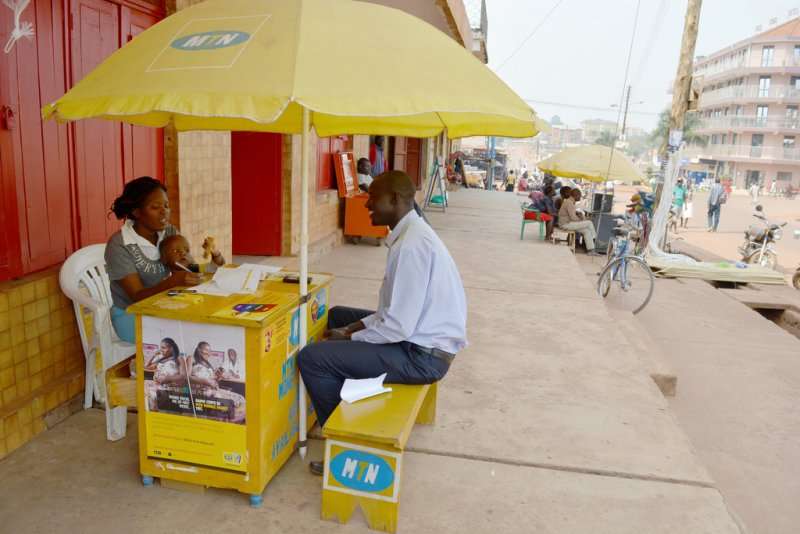CIPESATalks |
The evolution of the digital economy in Uganda over the last 20 years has broken barriers associated to geography and time and thus enabled information flows critical for business processes, innovation, entrepreneurship, civic participation, learning and research, and government service delivery.
Following concerns on the growing public debt bill, and a constrained tax base, the Uganda government introduced a raft of taxes in the Excise Duty Act (Amended), notably on Over the Top (OTT) services and mobile money transactions. Beginning July 1, 2018, users must pay a tax of UGX 200 (USD 0.05) per day to access various social media platforms including Facebook, WhatsApp, Twitter and LinkedIn. For mobile money, a 1% levy applies to deposits and withdrawals, on top of a revised excise duty of 15% up from 10% on transfers. These taxes pose a huge threat on internet access and affordability, and financial inclusion for low income and marginalized groups such as women, youth and rural communities. In fact, the Alliance for Affordable Internet (A4AI) estimatesthat the social media tax will cost Uganda’s poorest up to 40% of their average monthly income to buy a basket of 1GB of data.
Accordingly, CIPESA in partnership with the Internet Society Uganda Chapter seeks to convene stakeholders to deliberate on the economic, social and human rights impact arising from the new taxes. The dialogue will deliberate on how policy making processes can advance inclusive and equitable access to the internet, promote innovation and consumer rights protection. The dialogue builds on previous ones convened by CIPESA, for multiple stakeholders in the ICT eco-system.
See full agenda here.
Uganda Blocks Access to Social Media, VPNs and Dating Sites as New Tax Takes Effect
By Juliet Nanfuka |
As of midnight on July 1, 2018, telecom companies in Uganda blocked access to social media platforms for all users and required them to pay a newly introduced Over-The-Top” (OTT) tax before regaining access. The tax resulted from a March 2018 presidential directive for social media to be taxed to raise resources “to cope with the consequences” of social media users’ “opinions, prejudices [and] insults”.
“In a context in which social media has served as many users’ initial entry point to the internet, this tax could negatively impact the affordability and broader use of the internet, particularly by low-income Ugandans, as well as stifle freedom of expression, association and assembly online.”
Joint oral statement to UN Human Rights Commission on Social Media Taxes by APC, CIPESA, Derechos Digitales and WOUGNET
The directive proposed that up to UGX 400 billion (USD 108 million) per annum could be collected through the taxes. Projections from the June 14 national budget speech for the fiscal year 2018/19 indicated that up to UGX 486 billion (USD 131 million) could be collected annually by 2022. Earlier in May, Uganda’s parliament passed the Excise Duty Act (Amendment) Bill 2018, which introduced a mandatory fee of UGX 200 (USD 0.05) per day of use for services that include messaging and voice calls via Whatsapp, Facebook, Skype and Viber.

The tax will likely push basic connectivity further out of reach for millions. At the USD 0.05 per day, a Ugandan user would need to fork out USD 1.5 per in monthly fees to access the OTT services. That would be hugely prohibitive since the average revenue per user (ARPU) of telecom services in Uganda stands at just USD 2.5 per month.
According to the Alliance for Affordable Internet (A4AI), at the end of 2016, a 1GB mobile broadband plan in Uganda cost more than 15% of average monthly income. The A4AI further states that with the excise duty in place, this cost to connect for Uganda’s poorest will jump by 10%, resulting in just 1GB of data costing them nearly 40% of their average monthly income.
 Section 2 of the Excise Duty Amendment Act provides that the tax will apply to “the transmission or receipt of voice or messages over the internet protocol network and includes access to virtual private networks but does not include educational or research sites prescribed by the Minister by notice in the Gazette.” The Uganda Revenue Authority (URA) has listed sites such as professional networking platform LinkedIn and dating sites such as Badoo and Tinder among those that would be accessed only upon payment. The government has not stated what constitutes educational or research sites.
Section 2 of the Excise Duty Amendment Act provides that the tax will apply to “the transmission or receipt of voice or messages over the internet protocol network and includes access to virtual private networks but does not include educational or research sites prescribed by the Minister by notice in the Gazette.” The Uganda Revenue Authority (URA) has listed sites such as professional networking platform LinkedIn and dating sites such as Badoo and Tinder among those that would be accessed only upon payment. The government has not stated what constitutes educational or research sites.
As of September 2017, Uganda had an internet penetration rate of 48%, in a country of 41 million people. Research shows that at least one in nine internet users in the country is signed up for a social networking site, with Facebook and WhatsApp the most popular. The introduction of the tax has accordingly elicited strong opposition from users including the limitation of payment only through mobile money, Electronic Virtual Cash (EVC) or any electronic wallet.
The Excise Duty Amendment Act also introduced a 1% tax on the value of every mobile money transaction which users will also have to pay in addition to the OTT tax. The Act also raised the tax on airtime for cellular, landline and public payphones from 5% to 12% and increased the tax on mobile money transfers from 10% to 15%.
Who pays the mobile charges incurred by using mobile money to pay the Social Media tax? Is this cost accounted for in your 200/= or is it over and above? #SocialMediaTax
— Evelyn Namara (@enamara) June 29, 2018
Some users are expressing frustration with having to pay twice – first the OTT tax, then the 1% tax on every mobile money transaction – in order to access social media and other blocked sites.
Many social media users have turned to using Virtual Private Networks (VPNs) to remain online and avoid the taxes. This is a similar stance to that taken during 2016, when Uganda had social media shutdowns on two occasions, leading to a surge in VPN use. However, access to some VPN sites – particularly free ones – has also been blocked and knowledge about VPN access and use is largely limited to tech savvy users. Further, there remains concern on the extent to which VPNs will be an affordable option due to their heavy data requirements.
The consumption of data by most of these VPNs will leave a handlful of Ugandans with 2 options.
1. Paying the #SocialMediaTax
2. Going offline for good!
— Q U A B R I E. (@morisatwine) July 1, 2018
A poll conducted by Daily Monitor newspaper on its Twitter handle showed that 19% of the 581 tweeps who participated would spend less time on social media, 11% would stop using social media, while 70% would resort to using VPN.
Further, imposition of the tax has consequences on net neutrality which requires that the Internet be maintained as an open platform on which network providers treat all content, applications and services equally, without discrimination. The tax effectively limits access to social media sites which are a primary entry point for many new users to the internet in developing countries including Uganda. Indeed, it is in social media platforms that many have found relatable local content including avenues for knowledge exchange, civic participation and economic opportunity.
We echoed @A4A_Internet call to the #Uganda government on repealing the #SocialMediaTax & focus on making access to the internet more inclusive and affordable for more citizens!https://t.co/dd9ZENxSsJ#InternetFreedomAfrica pic.twitter.com/hdSZVXjpkz
— CIPESA (@cipesaug) July 1, 2018
Telecommunications companies had previously sought to tap into the popularity of OTTs by offering competitive social medias data packages – such as such as MTNs SWIFT (Snapchat, WhatsApp, Instagram, Facebook and Twitter) and WTF (WhatsApp, Twitter, Facebook) – resulting in what was popularly referred to as “data price wars” that led to a drop in the price of access.
Meanwhile, the state also found value in the use of social media as an avenue for engaging with citizens and required all Ministries, Departments and Agencies (MDAs) to pursue a social media strategy to promote state-civic interaction which aimed at “improving effectiveness of communication, sharing of information and open engagement and discussions with the Public.” Results of the Uganda national IT survey 2017/18 indicated that 92% of MDAs have a social media presence with most using Facebook, Twitter and WhatsApp as their primary platforms for information dissemination and engagement with citizens.

The Uganda government did not conduct any public consultations before introducing the OTT tax, which is testament to the absence of a multi-stakeholder model of internet governance that would enable the perspectives of diverse stakeholders to support more informed policy decisions. This tax comes on the heels of a directive last March by the communications regulator for registration of online content providers. Uganda is potentially setting a worrying trend for the region, as neighbours Tanzania and Congo have similarly issued stringent online content regulations that threaten citizens’ rights to privacy and freedom of expression and promote self-censorship.
Uganda: New social media tax will push basic connectivity further out of reach for millions
By Alliance For Affordable Internet |
Uganda’s government has passed a new tax that will require citizens to pay UGX 200 (US$0.05) per day in order to use messaging and voice over-the-top services (OTTs), including Facebook, WhatsApp, Twitter, and Viber. The tax, slated to take effect on 1 July, will push the cost of basic internet access further out of reach for millions of low-income Ugandans. The government must take urgent action to reverse this measure.
The Excise Duty (Amendment) Bill 2018, passed last week by the Ugandan Parliament, calls for telecommunications service operators providing data used to access OTTs to pay an excise duty on this access. According to Reuters, the country’s mobile network operators are likely to pass these costs on to consumers, levying a daily tax on each SIM card used to access the relevant platforms and services. The impact on consumers in Uganda — and particularly on low-income users — will be significant, and is likely to force many of these users to curb their internet usage, or to forego access entirely.
Only five other countries in Africa (where data was available) have more expensive mobile internet plans than Uganda. At the end of 2016, a 1GB mobile broadband plan in Uganda cost more than 15% of average monthly income. This high cost is keeping Ugandans offline — according to the GSMA, individual mobile internet subscriber rates in Uganda stand at just 18% of the population.
The true cost to connect is even higher for those earning less than the average national income (i.e., less than US$630/year). For the lowest income group in Uganda (see graph below), purchasing the same 1GB plan costs them 30% of their average monthly income. With the excise duty in place, this cost to connect for Uganda’s poorest will jump by 10%, resulting in just 1GB of data costing them nearly 40% of their average monthly income. The richest Ugandans will also experience an increase of 1% in their cost to connect, and by and large, this new excise duty disproportionately and negatively impacts low-income Ugandans and their ability to affordably access the internet.

he Ugandan government has argued that such a tax is necessary both to reduce gossip (“lugambo”) on these platforms, and to raise funds needed to address the impacts of comments made on social media that are critical of the government. However, it has not provided any explanation as to how such a tax might change what people say on the platforms, nor how the funds collected would be used to address these impacts.
The government has also argued that this tax will help promote local content development by placing a tax on “imported content.” As consumers increasingly shift toward data-based services, mobile operators will have new opportunities to develop and offer their own OTT services on their networks. However, the current language in the bill makes the duty applicable to all voice and messaging OTTs, including those that could potentially be developed by mobile operators or Ugandan firms. This is precisely why regulators in other countries have opted not to intervene on OTTs — so that local companies can innovate and create jobs and value in the telecoms market. The government of Nigeria, for example, previously considered a tax on internet use, which was eventually scrapped as a result of studies showing it would make access unaffordable for millions of people.
For other local firms that rely on voice and messaging apps for sales and service, for example when they use WhatsApp to communicate with customers, this duty will hurt their businesses. Finally, from a consumer view, these services offer value for money to communicate and share with others beyond what existing voice and messaging services can provide.
Stifling internet uptake and use is also likely to result in failure to achieve the goals laid out in the Digital Uganda Vision.The ICT sector contributed 3.4% to Uganda’s GDP in 2015, and increasing internet access has the potential to spur significant socio-economic growth — a recent study showed that a 10% increase in mobile broadband penetration can increase economic growth by nearly 3%.
We urge the government of Uganda to:
- Repeal the excise duty amendment before it goes into effect, and
- Adopt an evidence-based approach to policy making for the sector, with a specific focus on better broadband planning, increased public access solutions, innovative spectrum policy, and more efficient use of universal service and access funds.
By focusing instead on these areas, the government can have a far more positive impact on increasing internet access, and promoting local content development and innovation.
Featured image: Bustling street scene in Kabale, Uganda (Photo credit: Adam Cohn, CC BY-NC-ND 2.0)
Uncertainty Over How Uganda’s New Social Media Tax Will be Collected
By Juliet Nanfuka |
On May 30, 2018, Uganda’s parliament passed the Excise Duty (Amendment) Bill 2018, which will see users of Over-The-Top (OTT) services that include messaging and voice calls via Whatsapp, Facebook, Skype and Viber pay a mandatory fee of UGX 200 (USD 0.05) per day of use. In another move that could hit affordability, stifle innovation, and undermine the role digital technologies play in socio-economic transformation, the amendment will also introduce a one percent fee on each mobile money transaction. However, it remains unclear how the tax on social media use would be collected.
The amendment bill was first introduced last April and was met with criticism over the new taxes, which many observers believe would make Information and Communication Technologies (ICT) inaccessible to majority of Ugandans. The taxes were proposed in response to a letter president Yoweri Museveni wrote to the finance ministry wherein he stated that the government needed resources “to cope with the consequences” of social media users’ “opinions, prejudices [and] insults”. Without mentioning mobile money, Museveni proposed a levy of UGX 100 (USD 0.025) per day per OTT user, but proposals by the finance ministry, since passed by parliament, doubled this figure.
Further, days after parliament passed the amendments bill, the finance minister reportedly stated that the tax rate on mobile money transactions should be 0.5% and not 1% and suggested that the bill could need revisiting.
Finance minister tells the press that he is surprised the 1% tax on mobile money slipped through parliament. He adds he was out of the country when it did. He says it should be 0.5% #NBSUpdates
— Mujuni Raymond (@qataharraymond) June 4, 2018
As of September 2017, Uganda had an internet penetration rate of 48%. Meanwhile, there were 23 million mobile money subscribers in a country of 37.7 million people, and their more than 340 million transactions during the third quarter of 2017 alone totalled UGX 18.1 trillion (USD 4.7 billion).
Mobile money has been a primary avenue of financial inclusion particularly for the unbanked. According to the Bank of Uganda, in 2015, only 16% of the population had a bank point of service within one kilometre of a home, whereas 54% of the population had a mobile money point of service within one kilometre.
Meanwhile, social media has served as many users’ initial entry point to internet use in many developing countries such as Uganda. This is among the reasons why OTT packages have been popular with telecommunications companies as tools to attract more clients. Introducing taxes on the use of these platforms could therefore negatively impact local content development and civic participation tools that rely on these services.
The proposals passed by Uganda’s parliament also include raising tax on airtime on cellular, landline and public payphones from 5% to 12% and the increase on the tax on mobile money transfers from 10% to 15%. .
The passing of the bill attracted various reactions on Twitter:
The Act will come into force starting 1st of July 2018 as per the bill. Does this mean that the enabling policies will be ready? pic.twitter.com/EmjOahnAba
— Kemigisa (@JackyKemigisa) May 31, 2018
The "WhatsApp tax" is causing a lot of confusion in Uganda, where people are wondering how exactly it will be implemented: https://t.co/BUUDKAYEFF pic.twitter.com/8iH7rJnMBS
— BBC News Africa (@BBCAfrica) May 31, 2018
In 2016, social media and mobile money services were shut down twice during the electioneering period.
One more thing, @UCC_Official should never shut down social media during elections because we are going to be paying #SocialMediaTax .
— Iribagiza David✌🏿 (@Owomunshozi) May 31, 2018
As a result of the shutdown of social media platforms, Virtual Private Networks (VPNs) became popular as users sought alternative avenues to remain online. There were no alternatives for mobile money users but the impact of the shutdown was felt by mobile money service providers such as the Airtel Uganda mobile money platform which at the time was used by around 650,000 unique users per day and processed around 30 billion Ugandan shillings (USD 8.8 million) according to FSD Uganda.
At a private sector dialogue hosted by the Collaboration on International ICT Policy in East and Southern Africa (CIPESA) a day after the passing of the bill, participants noted that the move to tax mobile money services could potentially force users to explore other alternatives for transactions, including reverting to cash or to new financial transaction models such as blockchain which is emerging as a potential alternative avenue for financial transactions in Uganda.
I never used Mobile Money that much until my bank introduced a system that allowed me to send money from my account to my phone. I have a trusted boda guy who can deliver cash anywhere so I will transact less generally with the new tax. #MMTax
— Grace Natabaalo (@Natabaalo) May 31, 2018
Uproar in Uganda as the gov passes legislation to tax mobile money transactions at 1% and social media usage at 200 USh per day! Those with less of course get hit the hardest paving a way for crypto adoption #Blockchain
@DalaFoundation #Accessforall https://t.co/ATfEsMcdiT— Norbert Haguma (@nhaguma) June 4, 2018
According to a 2017/18 Uganda National Information Technology Survey, social media platforms including OTT services are some of the popular avenues through which civic engagement has been pursued by the state. It remains to be seen how access to government services will be incorporated in the new tax model.
As we debate social Media taxes lets not forget Govt as well is going to pay social Media taxes thru its MDAs/officers bse they also use social platforms 4 some their work & govt is likely to be the biggest contributor to the social media taxes. #NBSMorningBreeze#SocialMediaTax
— Sarah Kyobe N. (@kyobesarah) June 1, 2018
With the taxation expected to come into effect as early as July 1, 2018, uncertainty remains over whether, if signed into law by the president, the tax would be executed given the limited public consultation and the absence of guidelines.





